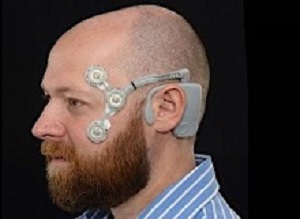
A ground-breaking wearable diagnostic headset to help patients with dizziness problems has moved a step forward following a successful trial. Researchers from the University of East Anglia (UEA) and the Norfolk and Norwich University Hospital (NNUH) have published the results of the biggest collection of continuous eye movement data after testing the effectiveness of the device.
The Continuous Ambulatory Vestibular Assessment (CAVA) aims to speed up the diagnosis of the most common causes of dizziness. A study into the accuracy, reliability and safety of the novel new device found the technology to be 99% accurate at detecting eye flicker (nystagmus).
In the trial, the CAVA device was worn by 17 participants, who did not have dizziness problems, for up to 30 days and captured 9,000 hours of eye and head movement data, totalling 405 days of data. The CAVA device has been designed to be lightweight, durable and can be worn day and night to monitor head and eye movements to help evaluate dizziness attacks outside of a hospital setting.
Professor Stephen Cox and Dr Jacob Newman, from UEA's School of Computing Sciences, developed algorithms to identify seconds of nystagmus from weeks of data recorded by the device.
Principal investigator John Phillips, who is a consultant ear, nose and throat surgeon at NNUH, said the first phase of trialling the device had involved inducing eye flicker on healthy patients. "Following years of development, I'm delighted that this project was successful in identifying short periods of visually induced nystagmus with a high degree of accuracy," he said.
"The success of this trial has proven the potential of this to fulfil a clinical need and establishing a new field of medicine, vestibular telemetry. These results have provided a good foundation from which to conduct a further study intended to evaluate the system's diagnostic accuracy among patients with dizziness problems."
Dr Jacob Newman, from UEA's School of Computing Sciences, said: "We are very pleased that our algorithms have been able to detect such small incidents of nystagmus within such a large dataset, this bodes well for future work that considers nystagmus in individuals experiencing dizziness."
The study was funded by the Medical Research Council.
Abstract
Dizziness is a common condition that is responsible for a significant degree of material morbidity and burden on health services. It is usually episodic and short-lived, so when a patient presents to their clinician, examination is normal. The CAVA (Continuous Ambulatory Vestibular Assessment) device has been developed to provide continuous monitoring of eye-movements, allowing insight into the physiological parameters present during a dizziness attack. This article describes the first clinical investigation into the medical and technical aspects of this new diagnostic system. Seventeen healthy subjects wore the device near continuously for up to thirty days, artificially inducing nystagmus on eight occasions. 405 days’ worth of data was captured, comprising around four billion data points. A computer algorithm developed to detect nystagmus demonstrated a sensitivity of 99.1% (95% CI: 95.13% to 99.98%) and a specificity of 98.6% (95% CI: 96.54% to 99.63%). Eighty-two percent of participants wore the device for a minimum of eighty percent of each day. Adverse events were self-limiting and mostly the consequence of skin stripping from the daily replacement of the electrodes. The device was shown to operate effectively as an ambulatory monitor, allowing the reliable detection of artificially induced nystagmus.
Authors
John S Phillips, Jacob L Newman, Stephen J Cox
[link url="http://www.uea.ac.uk/about/-/successful-first-trial-for-dizziness-monitoring-device"]University of East Anglia material[/link]
[link url="https://www.nature.com/articles/s41598-019-46970-7"]Scientific Reports abstract[/link]
